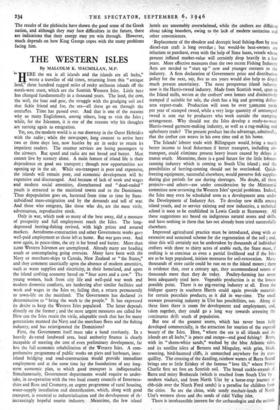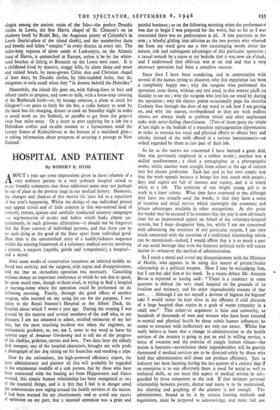THE WESTERN ISLES
By MALCOLM K. MACMILLAN, M.P.
11 ERE the sea is all islands and the islands are all lochs," wrote a traveller of old times, returning from this "antique land," these hundred rugged miles of rocky archaean islands off the north-west coast, which are the Scottish Western Isles. Little here has changed fundamentally in a thousand years. The land, the cow, the well, the boat and gear, the struggle with the grudging soil and that fickle friend and foe, the sea—all these go on through the centufies. Time has passed over. And that is one of the reasons why so many Englishmen, among others, long to visit the Isles ; while, for the Islesman, it is one of the reasons why his thoughts are turning again to emigration.
Yet, too, the modern world is at our doorstep in the Outer Hebrides with the radio ; while the newspaper, long content to arrive here two or three days late, now hustles by air in order to retain its impatient readers. The steamer services are losing passengers ro the airways. But speed and radio are not bread and butter. Man cannot live by scenery alone. A main feature of island life is their dependence on good sea transport ; though new opportunities aee opening up in the air. While sea-transport is poor and expensive, the islands will remain poor, and economic development will be expensive and discouraged. And because of lack of work and wages and modern social amenities, disenchanted and " dead-ended " youth is attracted to the mainland towns and to the Dominions Thus depopulation goes on, hastened from time to time by State - subsidised mass-emigration and by the demands and toll of war. And those who emigrate, like those who die, are the most virile, adventurous, reproductive stock.
Only in war, which took so many of the best away, did a measure of prosperity and full employment reach the Isles. The long- depressed herring-fishing revived, with high prices and assured markets. Aerodrome-construction and other Government works gave well-paid employment to those left at home. But war goes over. And now again, in peace-time, the cry is for bread and butter. More than 2,000 Western Islesmen are unemployed. Already many are heading south or contemplating going overseas. Many have been with the Navy or merchant-ships to Canada, New Zealand or "the States," and they comment caustically upon the absence of modern amenities, such as water supplies and electricity, in their homeland, and upon the island crofting economy based on "four acres and a cow." The young women, back from city life and well-paid war work and modern domestic comforts, are hankering after similar facilities and work and wages in the Isles or, failing that, a return permanently to town-life on the mainland. The Government has declared .its determination to "bring the work to the people." It has expressed its desire to keep the Western Isles populated. The latter depends directly on the former ; and the most urgent measures are called for How can the Isles retain the virile, adaptable stock that has for many generations manned the Navy and the merchant fleets and the fishing industry, and has reinvigorated the Dominions?
First, the Government itself must take a hand resolutely. In a heavily de-rated landward area, local authority finance is clearly incapable of meeting the cost of even preliminary development, far less the full economic rehabilitation of the Western Isles. A com- prehensive programme of public works on piers and harbours, inter- island bridging and road-construction would provide immediate employment and at the same time lay the foundations of any long- term economic plan, to which good transport is indispensable Simultaneously, Government'departments would require to under- take, in co-operation with the two local county councils of Inverness- shire and Ross and Cromarty, an urgent programme of rural housing, water-supply installation and electrification, which, along with good transport, is essential to industrialisation and the development of tir increasingly hopeful tourist industry. Meantime, the few island hotels are seasonably overwhelmed, while the crofters are diffident about taking boarders, owing to the lack of modern sanitation and other conveniences.
• Replacement of the obsolete and decrepit local fishing-fleet by new diesel-run craft is long overdue ; but would-be boat-owners are reluctant to purchase, even with the help of State loans, vessels whose present inflated market-value will certainly drop heavily in a few years. More effective measures than the two recent Fishing Industry Acts are needed to "start up" new and younger entrants to the industry. A firm declaration of Government price and distribution policy for the next, say, five to ten years would also help to dispel much present uncertainty. The most prosperous island industry now is the Harris-tweed industry. Made from Scottish wool, spun in the Island mills, woven at the crofters' own homes and distinctively stamped if suitable for sale, the cloth has a big and growing dollar- area export-trade. Production will soon be over 3,000,000 yards per year of stamped tweed, while a very large quantity of unstamped tweed is sent out by producers who work outside the stamping arrangement. Why should not the Isles develop a ready-to-wear Harris-tweed garment-making industry, as well as a rug-making and upholstery trade? The present product has the advantage, admittedly, that the crofter can weave in his own time and at his home.
The Islands' lobster trade with Billingsgate would_bring a much better income to local fishermen if better transport, including air- transport, could eliminate present heavy losses caused by delays in transit south. Meantime, there is a good future for the little lobster- canning industry which is coming to South Uist island ; and the possibilities of herring-canning should not be overlooked. Quick- freezing equipment, successful elsewhere, would preserve fish supplie; during glut periods for use during shortages. No doubt, all these projects—and others—are under consideration by the Ministerial committee now reviewing the Western Isles' special problems. Indeed, the Isles may even be scheduled soon as a development area under the Development of Industry Act. To develop new skills among island youth, and to service existing and new industries, a technical school is soon to be established in Lewis Castle at Stornoway. All these suggestions are based on indigenous natural assets and skills, and have nothing in them that has not already been tried successfully elsewhere.
Improved agricultural practice must be introduced, along with an extensive and sustained scheme for the regeneration of the soil ; and, since this will certainly not be undertaken by thousands of individual crofters with three to thirty acres of arable each, the State must, if crofting is to continue as even a partial livelihood and if the Isle; are to be kept populated, initiate measures for soil-restoration. Mani thousands of store cattle could be run on to the island moors ; there is evidence that, over a century ago, they accommodated scores of thousands more than they do today. Poultry-farming has never been adequately tried here. Vegetable production is at the lowest possible point. There is no pig-rearing industry at all. Even the feldspar quarry in southern Harris could again provide materials for certain porcelain products, as it did in war-time. The small seaware processing industry in Uist has possibilities, too. Along ill these lines there is room for development and employment, and, taken together, they could go a long way towards arresting the continuous drift south of population.
But one of the greatest assets, which has never been fully developed commercially, is the attraction for tourists of the especial beauty of the Isles. Here, "where the sea is all islands and Lhe islands are all lochs," is peace and escape—and good fishing! Barra, with its "sheen-white sands," washed by the blue Atlantic tides, and its satellite islets of Bernera and Mingulay, with grim, black, towering, bird-haunted cliffs, is unmatched anywhere for its tran- quillity. The crossing of the dazzling, rainbow waters of Barra Sound brings one to little Eriskay of the famous "love lilt," where Prince Charlie first set foot on Scottish soil. The broad cockle-strands of Barra and misty Benbecula (which is reached from South Uist by • modern viaduct, and from North Uist by a horse-trap journey ebb-tide over the North Ford sands) is a paradise for children from the cities. So are the clean, wide sandy machair-lands of North Uist's western shore and the sands of tidal Vallay islet. There is inexhaustible interest for the archaeologist and the ecclesi- °login among the ancient ruins of the Isles—the perfect Druidic circles in Lewis, the fine Harris chapel of St. Clement's on its shadowy knoll by Rodel Bay, the Augustan priory of Columba's in Lewis (burial-place of the island chiefs), and the numberless duns and brochs and fallen " temples" in every district in every isle. The miles-long expanse of silver sands at Luskentyre, on the Atlantic coast of Harris, is unmatched in Europe, unless it be by the white- sand beaches of Islivig or Breanish on the Lewis west coast. It is a childhood lived by massive, craggy hills, by silent shore and moor and ruined broth, by moss-grown Celtic dun and Christian chapel of later days, by Druidic circles, by islet-studded lochs, that the emigrants in exile recall when they "in dreams behold the Hebrides."
Meanwhile, the island life goes on, with fishing-lines to bait and lobster creels to prepare, and cows to milk, with a horse-trap crossing of the Benbecula fords—or, by strange contrast, a plane to catch for Glasgow I—or pears to fetch for the fire, a radio battery to send by the local bus for charging, dinner to cook on Saturday night in order to avoid work Am the Sabbath, or paraffin to get from the general shop four miles away. Or a letter to post applying for a job for a Hebridean crofter and ex-able seaman as a furnaceman amid the factory fumes of Kinlochleven at the bottom of a mainland glen— or asking information about prospects of securing a passage to New Zealand.-



























 Previous page
Previous page